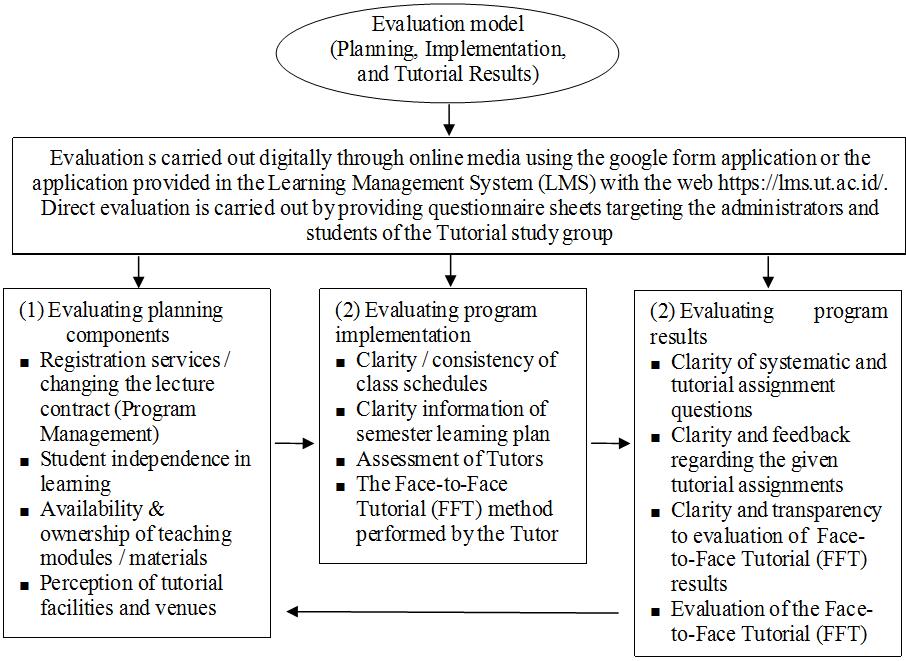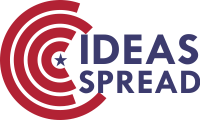Designing Online Learning Evaluation in Times of Covid-19 Pandemic
Abstract
The research objective is to design of learning evaluation that becomes strategy in the Covid Pandemic 19. The study used qualitative research methods with case studies that construct unique and important special realities through data collection interviews and discussions by using case study analysis. The data was collected through online media such as google meetings as well as direct observation from informants, who were determined by purposive sampling, namely the management and student representatives of study groups at the Open University of Purwokerto City and private education institution of Pakis school in Cilongok District in Banyumas regency, Central Java of Indonesia. The research result that the process of service and implementation of education as well as its evaluation during the Covid-19 pandemic must still take place using adaptation and innovation strategies in the form of online learning media through the application media for the Microsoft Teams and Learning Management System (LMS) program. Implementing innovative learning through online media has been successfully implemented practically and effectively, but there is still a need for special socialization and training on an ongoing basis. Evaluation of services and implementation of education is very important to do to provide program improvement and results and evaluation could be effectively carried out through google form and Learning Management System (LMS).
References
An, T., & Oliver, M. (2021). What in the world is educational technology? Rethinking the field from the perspective of the philosophy of technology. Learning, Media and Technology, 46(1), 6-19. https://doi.org/10.1080/17439884.2020.1810066
Ardhi, M. I. (2015). Evaluasi manajemen penerimaan peserta didik baru sistem real time online dinas pendidikan kota Yogyakarta. Jurnal Penelitian Ilmu Pendidikan, 8(1), 80-94. https://doi.org/10.21831/jpipfip.v8i1.4930
Arini, P. D., Matin, M., & Zulaikha, S. (2021). Curriculum management during the covid-19 emergency. Journal of Education Research and Evaluation, 5(2), 107-116. https://doi.org/10.23887/JERE.V5I2.31593
Asmawi, M. R. (2005). Strategi meningkatkan lulusan bermutu di pergutuan tinggi. Makara Human Behavior Studies in Asia, 9(2), 66-71. https://doi.org/10.7454/mssh.v9i2.124
Bauman, Z. (2009). Education in the liquid-modern setting. Power and Education, 1(2), 157-166. https://doi.org/10.2304/power.2009.1.2.157
Bhattacharya, S. (2020). Education as empowerment: Review of pedagogy of the oppressed. Journal of Political Science Education, 16(3), 403-406. https://doi.org/10.1080/15512169.2019.1632715
Budi, K., Setiawati, A., & Guntara, D. (2018). Learning, evaluation, and planning (LEAP) model to evaluate the WVIs economic development program in Poso, Central Sulawesi, Indonesia, in The 2nd International Conference on Vocational Higher Education (ICVHE) 2017. “The Importance on Advancing Vocational Education to Meet Contemporary Labor Demands, KnE Social Sciences, 875-903. https://doi.org/10.18502/kss.v3i11.2814
Creswell, J. W., Hanson, W. E., Clark Plano, V. L., & Morales, A. (2007). Qualitative research designs: Selection and implementation. The Counseling Psychologist, 35(2), 236-264. https://doi.org/10.1177/0011000006287390
Daniel, S. J. (2020). Education and the covid-19 pandemic. Prospects, 49(1-2), 91-96. https://doi.org/10.1007/s11125-020-09464-3
Datta, L. (2007). Evaluation theory, models, and applications, by Daniel L. Stufflebeam and Anthony J. Shinkfield. San Francisco: Jossey-Bass, 2007. 768 pp. $70.00. American Journal of Evaluation, 28(4), 573-576. https://doi.org/10.1177/1098214007308902
Davis, D. R., Ellett, C. D., & Annunziata, J. (2002). Teacher evaluation, leadership and learning organizations. Journal of Personnel Evaluation in Education, 16(4), 287-301. https://doi.org/10.1023/a:1021791907098
Divayana, D. G. H., & Sugiharni, G. A. D. (2016). Evaluasi program sertifikasi komputer pada universitas teknologi Indonesia menggunakan model CSE-UCLA. JPI (Jurnal Pendidikan Indonesia), 5(2), 158-165. https://doi.org/10.23887/jpi-undiksha.v5i2.8586
Hammond, L. D., Flook, L., Cook-Harvey, C., Barron, B., & Osher, D. (2020). Implications for educational practice of the science of learning and development. Applied Developmental Science, 24(2), 97-140. https://doi.org/10.1080/10888691.2018.1537791
Hillman, T., & Säljö, R. (2016). Learning, knowing and opportunities for participation: technologies and communicative practices. Learning, Media and Technology, 41(2), 306-309. https://doi.org/10.1080/17439884.2016.1167080
Huiru, Y. (2014). A case study: Innovation of internal teaching and learning evaluation system in higher education institutions. Chinese Education & Society, 42(1), 95-104. https://doi.org/10.2753/CED1061-1932420108
Jin, L., Wen, Z., & Gough, N. (2010). Social virtual worlds for technology‐enhanced learning on an augmented learning platform. Learning, Media and Technology, 35(2), 139-153. https://doi.org/10.1080/17439884.2010.494424
Khan, M. A., & Usman, M. (2015). Education quality and learning outcomes in higher education institutions in Pakistan. In Taylor’s 7th Teaching and Learning Conference 2014 Proceedings (pp. 449-463). Springer Singapore. https://doi.org/10.1007/978-981-287-399-6_41
Kurnia, F., Rosana, D., & Supahar. (2017). Developing evaluation instrument based on CIPP models on the implementation of portfolio assessment. AIP Conference Proceedings, 1868(1), 080003. https://doi.org/10.1063/1.4995187
Lawson, T. (2011). Empowerment in education: Liberation, governance or a distraction? A review. Power and Education, 3(2), 89-103. https://doi.org/10.2304/power.2011.3.2.89
Lederman, N. G., & Lederman, J.S. (2017). The education and evaluation of effective teaching: The continuing challenge for teacher educators and schools of education. Journal of Science Teacher Education, 28(7), 567–573.https://doi.org/10.1080/1046560X.2017.1407175
Martin, J., & Lawson, T. (2013). Whose empowerment? The dynamics of power and choice in managing student access to personalised key stage 4 options. Power and Education, 5(2), 159-172. https://doi.org/10.2304/power.2013.5.2.159
Mayers, E. M., Erickson, I., & Small, R. V. (2013). Digital literacy and informal learning environments: an introduction.Learning, Media and Technology, 38(4), 355-367. https://doi.org/10.1080/17439884.2013.783597
Moorhouse, B. L. (2020). Adaptations to a face-to-face initial teacher education course ‘forced online due to the covid-19 pandemic. Journal of Education for Teaching, 46(4), 609-611. https://doi.org/10.1080/02607476.2020.1755205
Mor, Y., & Winters, N. (2007). Design approaches in technology-enhanced learning. Interactive Learning Environments, 15(1), 61-75. https://doi.org/10.1080/10494820601044236
Prastati, T. (2011). Program pelatihan instructor universitas terbuka. Jurnal Evaluasi Pendidikan, 2(2), 206-217. https://doi.org/10.21009/jep.022.08
Rashid, Y., Rashid, A., Warraich, M. A., Sabir, S. S., & Waseem, A. (2019). Case study method: A step-by-step guide for business researchers. International Journal of Qualitative Methods, 18, 1-13. https://doi.org/10.1177/1609406919862424
Sabiq, A., Sulaiman, A. I., & Sugito, T. (2020). Family empowerment program as community education in supporting the prevention of the covid-19 pandemic. International Educational Research, 3(3), 22-32. https://doi.org/10.30560/ier.v3n3p22
Şanli, O. (2019). An evaluation of the teachers classroom management problems. Educational Research and Reviews, 14(8), 282-292. https://doi.org/10.5897/ERR2019.3712
Sims, M., & Brettig, K. (2018). Early childhood education and early childhood development: Do the differences matter? Power and Education, 10(3), 275-287. https://doi.org/10.1177/1757743818771986
Sitthisak, O., Gilbert, L., & Davis, H. C. (2008). An evaluation of pedagogically informed parameterised questions for self‐assessment. Learning, Media and Technology, 33(3), 235-248. https://doi.org/10.1080/17439880802324210
Spante, M., Hashemi, S. S., Lundin, M., & Algers, A. (2018). Digital competence and digital literacy in higher education research: Systematic review of concept use. Cogent Education, 5(1), 1-21.https://doi.org/10.1080/2331186X.2018.1519143
Sugiran, S., Daulay, P., Zaman, B., Effendy, F., & Amalia, L. (2016). Evaluasi instructor online untuk meningkatkan kualitas layanan instructorial tatap muka pada pendidikan jarak jauh. Journal of Information Systems Engineering and Business Intelligence, 2(1), 1-10. https://doi.org/10.20473/jisebi.2.1.1-10
Sulaiman., A. I., & Ahmadi, D. (2020). Empowerment communication in an islamic boarding school as a medium of harmonization. Jurnal Komunikasi: Malaysian Journal of Communication, 36(4), 323-338. https://doi.org/10.17576/JKMJC-2020-3604-20
Sulaiman, A. I., Chusmeru., Adi, T. N., Jati., P. I. P., Runtiko, A. G., & Sutikna, N. (2020). Empowerment program design in edutourism management post pandemic covid 19. Journal of Economics and Management Sciences, 3(3), 1-13. https://doi.org/10.30560/jems.v3n3p1
Suparto, S. P. (2012). Evaluasi program e-learning bagi petugas lapangan. Jurnal Cakrawala Pendidikan, 31(1), 102-128. https://doi.org/10.21831/cp.v0i1.1470
Suratno, S. (2018). Manajemen sistem penjaminan mutu internal sekolah dalam upaya pengembangan program akademik unggulan. Media Manajemen Pendidikan, 1(2), 217-224. https://doi.org/10.30738/mmp.v1i2.3255
Suryanto, A., Gafur, A., & Sudarsono, F. (2013). Model evaluasi program instructorial tatap muka universitas terbuka. Jurnal Penelitian Dan Evaluasi Pendidikan, 17(2), 198-214. https://doi.org/10.21831/pep.v17i2.1695
Tan, E. (2013). Informal learning on YouTube: Exploring digital literacy in independent online learning. Learning, Media and Technology, 38(4), 463-477. https://doi.org/10.1080/17439884.2013.783594
Vargas, O. L. P. (2015). The quality of educational institutions: Well-trained and virtuous educational directors and teachers. Procedia - Social and Behavioral Sciences, 197, 456-459. https://doi.org/10.1016/j.sbspro.2015.07.166
Verma, G., Campbell, T., Melville, W., & Park, B. Y. (2020). Science teacher education in the times of the covid-19 pandemic. Journal of Science Teacher Education, 31(5), 483-490. https://doi.org/10.1080/1046560X.2020.1771514
Voigt, C., & Swatman, P. (2004). Contextual e-learning evaluation: A preliminary framework. Journal of Educational Media, 29(3), 175-187.https://doi.org/10.1080/1358165042000283057
Wardrip, P. S., & Shapiro, R. B. (2016). Digital media and data: using and designing technologies to support learning in practice. Learning, Media and Technology, 41(2), 187-192. https://doi.org/10.1080/17439884.2016.1160929
Widyaningrum, R., & Prihastari, E. B. (2020). Student worksheet based on Surakarta’s local wisdom in primary school: A preliminary research. International Journal of Science and Applied Science: Conference Series, 4(1), 2549-4635. https://doi.org/10.20961/ijsascs.v4i1.49458
Williamson, B., Eynon, R., & Potter, J. (2020). Pandemic politics, pedagogies and practices: digital technologies and distance education during the coronavirus emergency. Learning, Media and Technology, 45(2), 107-114. https://doi.org/10.1080/17439884.2020.1761641


This work is licensed under a Creative Commons Attribution 4.0 International License.
Copyright for this article is retained by the author(s), with first publication rights granted to the journal.
This is an open-access article distributed under the terms and conditions of the Creative Commons Attribution license (http://creativecommons.org/licenses/by/4.0/).








1.png)

















